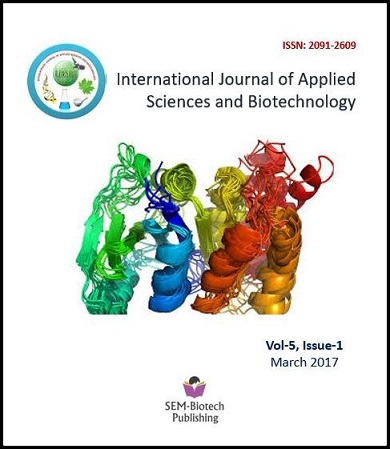Swasth Mahila Swasth Pariwar: A Screening Program for Women to Detect Common Health Problems in Cost Effective Manner
DOI:
https://doi.org/10.3126/ijasbt.v5i1.17025Keywords:
Anaemia, women, Health, vaginal, diabetesAbstract
Objectives- A woman is pivot of a family, but they hardly pay attention to their health. The present study aimed to screen the women for common health problems under one roof. A programme “Swasth Mahila, Swasth Pariwar” was conducted in a small hospital set up and cost effective manner. Material and Methods- 408 women, above 18 years were screened for the study after obtaining their consent, 294 were enrolled and were subjected to a questionnaire regarding sociodemographic factors, dietary habits and medical history. Anthropometry and clinical examination was followed by laboratory investigations including Hb%, TLC, DLC, P/S for anaemia, Urine analysis, Blood Glucose. Vaginal cytology with special staining in patients complaining of vaginal discharge (n=128). After screening, patients were referred to separate special clinics accordingly for homoeopathic treatment and follow up. Collaboration with family planning department was done to educate them about family planning practices. Results- The prevalence of anaemia was 40.14% (mean haemoglobin 10.1g/dl). 64.4% had mild, 33.1% had moderate and 2.5% had severe anaemia. 92 % women had iron deficiency anaemia. The prevalence of diabetes was 11.57% and pre-diabetes was 28.9 %. 13 new diabetic and 35 UTI cases were identified. 45.3% women had bacterial vaginosis, 10.9% had trichomoniasis, 17.2% had candidiasis and 0.8% had candidiasis with bacterial vaginosis. All the facilities including consultation, medical examination and laboratory testing were free of charge. The expenditure on laboratory testing for each patient was Rs 300 (approx). Conclusion- This programme helped to identify nutritional, lifestyle disorders and to generate awareness to improve the sexual health status of women in a cost effective manner.
Int. J. Appl. Sci. Biotechnol. Vol 5(1): 86-90




